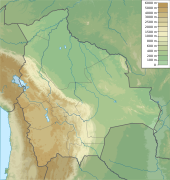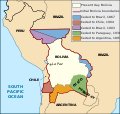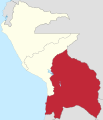Portal:Bolivia
| Portal | WikiProject | Peer Review | Assessment | Task Force |
IntroductionWelcome to the Bolivia portal
  Bolivia, officially the Plurinational State of Bolivia, is a landlocked country located in western-central South America. It is bordered by Brazil to the north and east, Paraguay to the southeast, Argentina to the south, Chile to the southwest, and Peru to the west. The seat of government and administrative capital is La Paz, which contains the executive, legislative, and electoral branches of government, while the constitutional capital is Sucre, the seat of the judiciary. The largest city and principal industrial center is Santa Cruz de la Sierra, located on the Llanos Orientales (eastern tropical lowlands), a mostly flat region in the east of the country. The sovereign state of Bolivia is a constitutionally unitary state divided into nine departments. Its geography varies as the elevation fluctuates, from the western snow-capped peaks of the Andes to the eastern lowlands, situated within the Amazon basin. One-third of the country is within the Andean mountain range. With an area of 1,098,581 km2 (424,164 sq mi), Bolivia is the fifth-largest country in South America after Brazil, Argentina, Peru and Colombia, and, alongside Paraguay, is one of two landlocked countries in the Americas. It is the 27th largest country in the world, the largest landlocked country in the Southern Hemisphere, and the seventh largest landlocked country on earth, after Kazakhstan, Mongolia, Chad, Niger, Mali, and Ethiopia. Bolivia experienced a succession of military and civilian governments until competitive authoritarian regime. Freedom House classifies Bolivia as a partly-free democracy as of 2023, with a 66/100 score. (Full article... )
Selected article - hydrocarbon reserves. Further east close to the border with Brazil lies the Guaporé Shield, made up of stable Precambrian crystalline rock. (Full article... )Did you know (auto-generated)
Selected pictureGeneral imagesThe following are images from various Bolivia-related articles on Wikipedia.
CategoriesTopics |


























